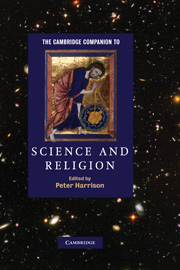Book contents
- Frontmatter
- Introduction
- Part I Historical interactions
- Part II Religion and contemporary science
- 6 Scientific creationism and intelligent design
- 7 Evolution and the inevitability of intelligent life
- 8 God, physics and the Big Bang
- 9 Psychology and theology
- 10 Science, bioethics and religion
- Part III Philosophical perspectives
- A guide to further reading
- Index
9 - Psychology and theology
from Part II - Religion and contemporary science
Published online by Cambridge University Press: 28 July 2010
- Frontmatter
- Introduction
- Part I Historical interactions
- Part II Religion and contemporary science
- 6 Scientific creationism and intelligent design
- 7 Evolution and the inevitability of intelligent life
- 8 God, physics and the Big Bang
- 9 Psychology and theology
- 10 Science, bioethics and religion
- Part III Philosophical perspectives
- A guide to further reading
- Index
Summary
This chapter is about the dialogue between psychology and theology. I will first briefly distinguish this specific topic from others to do more generally with the interface of psychology and religion. One of those is the practical application of psychology to the work of faith communities. Here the primary focus has been the area of pastoral care (although in Psychology for Christian Ministry I showed that the potential practical application of psychology to religion is much broader). In contrast, the dialogue between theology and psychology is focused more on truth questions and less on practical ones. Another intersection between psychology and religion is the psychology of religion - one of several human sciences, including sociology and social anthropology, which are concerned with religious belief and practice. The psychology of religion generally takes as detached a view as possible of religious phenomena. This observational approach to religion is not my central focus in this chapter, although I will return later to those aspects of the dialogue between theology and psychology which deal with the nature of religion itself. The dialogue between theology and science is notoriously one-sided, as will have been apparent from other chapters in this volume. Theology has been much more interested in science than science has been in theology. Individual scientists may be interested in theology, but it is difficult to argue that theology has much contribution to make to science as such.
- Type
- Chapter
- Information
- The Cambridge Companion to Science and Religion , pp. 190 - 206Publisher: Cambridge University PressPrint publication year: 2010
- 9
- Cited by



